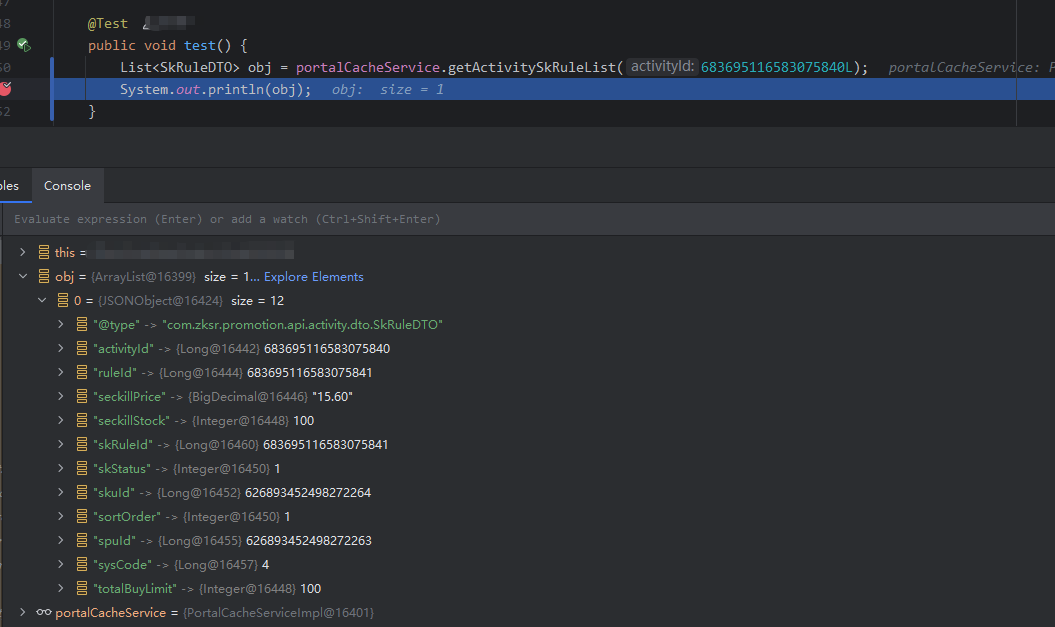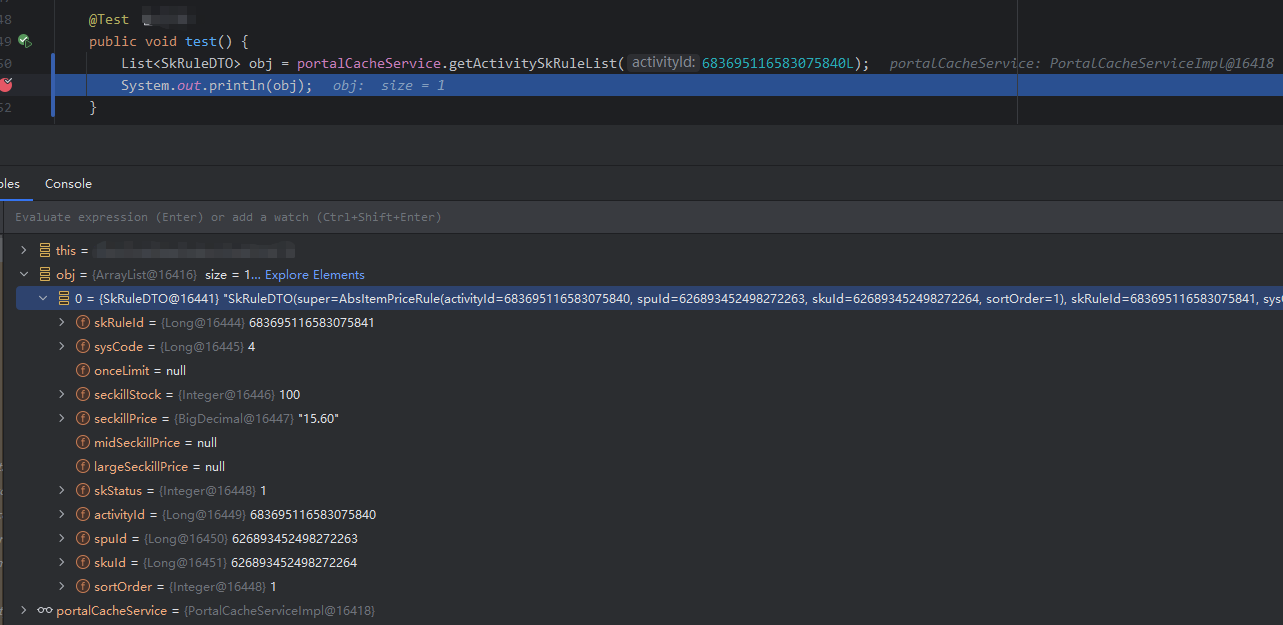1. 如果缓存的value 是一个list, jetcache json 序列化 无法解析泛型具体类型

- 可以看到, ArrayList 的元素是 JsonObject
- 正常使用是没有问题, 但是如果使用 JDK stream 流编程的话, 就会出现对象转换异常
2. 常规解决办法, JSON 序列化指定 class类型
Encode
- 存在 "@type" 注入安全问题
java
public class JetCacheFastjson2ValueEncoder extends Fastjson2ValueEncoder {
public JetCacheFastjson2ValueEncoder(boolean useIdentityNumber) {
super(useIdentityNumber);
}
@Override
public byte[] apply(Object value) {
return super.apply(value);
}
@Override
protected byte[] encodeSingleValue(Object value) {
return JSON.toJSONString(value, JSONWriter.Feature.WriteClassName).getBytes();
}
}Decode
- 存在 "@type" 注入安全问题, 不建议
java
public class JetCacheFastjson2ValueDecoder extends Fastjson2ValueDecoder {
public static final JetCacheFastjson2ValueDecoder INSTANCE = new JetCacheFastjson2ValueDecoder(true);
public JetCacheFastjson2ValueDecoder(boolean useIdentityNumber) {
super(useIdentityNumber);
}
@Override
protected Object parseObject(byte[] buffer, int index, int len, Class clazz) {
String s = new String(buffer, index, len, StandardCharsets.UTF_8);
return JSON.parseObject(s, clazz, JSONReader.Feature.SupportAutoType);
}
}
3. 自定义指定具体泛型 Decode 解码器 (推荐) 改动较少
- 例如我们定义一个 List 泛型解码器
- 问题就是需要让decode 知道具体的list 泛型类型
- 通过显性传参指定泛型类型
还是原来的 Encode, 只是不需要输出指定类型了
- 不指定classs类型
java
public class JetCacheFastjson2ValueEncoder extends Fastjson2ValueEncoder {
public JetCacheFastjson2ValueEncoder(boolean useIdentityNumber) {
super(useIdentityNumber);
}
@Override
public byte[] apply(Object value) {
return super.apply(value);
}
@Override
protected byte[] encodeSingleValue(Object value) {
return JSON.toJSONString(value).getBytes();
}
}3.1 新建一个集合Json处理器 JetCacheFastjson2CollecationValueDecoder.java
java
public class JetCacheFastjson2CollecationValueDecoder<T> extends AbstractJsonDecoder{
private final Class<T> collectionClassz;
public JetCacheFastjson2CollecationValueDecoder(Class<T> classz) {
super(true);
this.collectionClassz = classz;
}
@Override
protected Object parseObject(byte[] buffer, int index, int len, Class clazz) {
String s = new String(buffer, index, len, StandardCharsets.UTF_8);
if (Collection.class.isAssignableFrom(clazz)) {
return JSON.parseArray(s, collectionClassz);
}
return JSON.parseObject(s, clazz);
}
@Override
public Object apply(byte[] buffer) {
try {
return this.doApply(buffer);
} catch (Exception e) {
throw new RuntimeException(e);
}
}
}3.2 如果是List缓存或者其他的泛型缓存, 自定义定制解码器, 增强实现
- ActivitySkRuleCacheBean 缓存配置对象
java
@Configuration
public class ActivitySkRuleCacheBean {
@Autowired
private CacheManager cacheManager;
// 活动id
private Cache<Long, List<SkRuleDTO>> skRuleCache;
@PostConstruct
public void init() {
//自动刷新 对一些key比较少,实时性要求不高,加载开销非常大的缓存场景,适合使用自动刷新。
RefreshPolicy policy = RefreshPolicy.newPolicy(200, TimeUnit.MINUTES)//指定1小时刷新一次
.stopRefreshAfterLastAccess(DAY_MINUTE, TimeUnit.MINUTES);//1天如果没有访问就停止刷新 指定该key多长时间没有访问就停止刷新,如果不指定会一直刷新
QuickConfig qc = QuickConfig.newBuilder(ACTIVITY_SK_RULE)
.expire(Duration.ofMinutes(DAY_MINUTE))//过期时间为1天
.cacheType(CacheType.REMOTE)
//本地缓存更新后,将在所有的节点中删除缓存,以保持强一致性
.syncLocal(true)//invalidate local cache in all jvm process after update(更新后使所有JVM进程中的本地缓存失效)
.refreshPolicy(policy)
.valueDecoder(((bytes)-> new JetCacheFastjson2CollecationValueDecoder<>(SkRuleDTO.class).apply(bytes)))
.penetrationProtect(true)//当缓存访问未命中的情况下,对并发进行的加载行为进行保护。 当前版本实现的是单JVM内的保护,即同一个JVM中同一个key只有一个线程去加载,其它线程等待结果。
.build();
skRuleCache = cacheManager.getOrCreateCache(qc);
}
@Bean
public Cache<Long, List<SkRuleDTO>> getSkRuleCache() {
return skRuleCache;
}
}重点
valueDecoder(((bytes)-> new JetCacheFastjson2CollecationValueDecoder<>(SkRuleDTO.class).apply(bytes)));
为当前缓存List泛型指定具体类型
4. 效果

成功变成了具体对象类型, 并且, 不存在 @type 安全问题